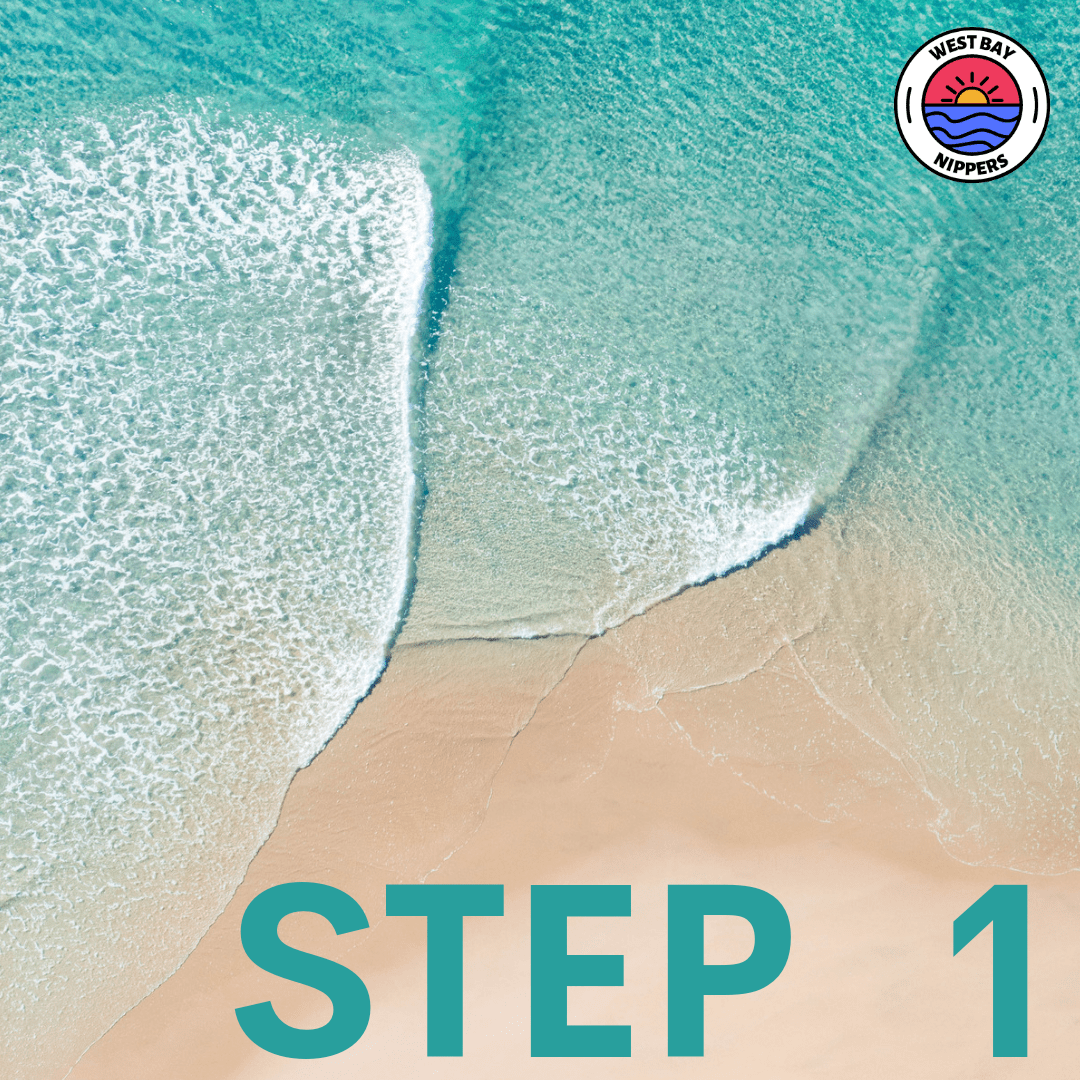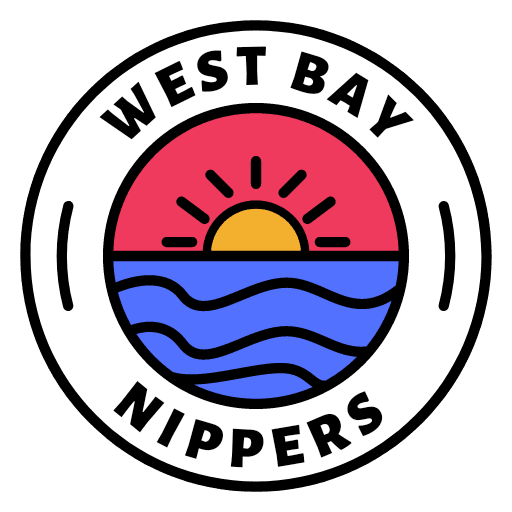
Participants need to complete three swim tests before joining the intermediate and advanced groups:
- Swim and complete a 25m survival stroke swim test in a swimming pool. We have also allocated certain dates to complete the tests during the West Bay Nippers lessons at the beach.
- Tread Water/Float for 2 minutes in a swimming pool
- Signal for help in the water
Parents/Guardians can submit video evidence of the successful completion of the three tests.
I will regularly take my children to an indoor swimming pool. Please feel free to contact me, and we can find a convenient time and place to meet up for a swim at a local swimming pool.
Step 2:
Complete Surf Swimmer Level 3
Skills Evaluation: The participant will start in waist-deep water. Then, the coach and the participant will swim fifteen meters out to sea to a water safety crew member on a surfboard. The participant may hold onto the surfboard and take a short rest. We will swim back together to the shore. The Surf Swimmer Level 3 test ends when the participant can securely stand up in waist-deep water.
We will use the “buddy system” during the Surf Swimmer Level 3 test. If the participant needs assistance or wants to adjust their swim goggles during the test, they may reach out and hold onto the rescue tube or their buddy’s arm. The participant’s buddy for this test is the coach, Graeme Charles/雷門.
The participant can decide to continue the test or return to the beach.
Participants who complete Step 1 and Step 2 will:
- Make it onto the official participant list.
- Receive specialized training for swimming and surfing
The West Bay Nippers surf safety program introduces children (6-11 years old) to surfing and youth surf lifesaving. We will also offer “Micro Nippers” for younger kids.
Under 6s age group (also known as Micro Nippers):
*Micro Nippers will stay in shallow water. They don’t do Step 1 and Step 2 swim tests.
- Water Familiarization: Nippers should be comfortable and confident in shallow water, able to enter and exit the water independently, and demonstrate basic water skills like splashing, kicking, and blowing bubbles.
- Water Safety Awareness: Nippers should understand basic water safety rules, such as staying close to an adult or designated area, not entering the water alone, and always asking for permission before going near the water.
- Floating and Balance: Nippers should be able to float on their front and back with support or minimal assistance, maintaining balance and comfort in the water.
- Introduction to Basic Water Skills: Nippers should be introduced to basic swimming skills such as arm movements, kicking, and blowing bubbles while submerged.
- Beach Awareness: Nippers should begin to understand the beach environment, such as identifying the shoreline and recognizing lifeguards and their role.
- Listening Skills: Nippers should demonstrate the ability to follow simple instructions and listen attentively to their instructors.
- Confidence Building: Nippers should engage in activities promoting water confidence and a positive attitude towards swimming and the beach.
The primary focus at this age should be on fostering a love for the water, building confidence, and introducing basic water safety concepts.
Under 8s age group in the Nippers Education Program:
Participants must complete three swim tests before joining the intermediate and advanced training groups.
- Water Confidence: Nippers should display a higher level of water confidence, be comfortable in waist-deep water, and be able to submerge their faces.
- Basic Swimming Skills: Nippers should demonstrate basic swimming skills such as freestyle and backstroke. They should be able to swim short distances independently or with minimal support.
- Water Safety Knowledge: Nippers should have a basic understanding of water safety rules, including recognizing flags and signage, staying within designated swim areas, and listening to lifeguard instructions.
- Floating and Treading Water: Nippers should be able to float and maintain a stable body position on their front and back. They should also demonstrate basic skills in treading water to stay afloat for a short period.
- Introduction to Surf Awareness: Nippers should start developing an awareness of the surf environment, including understanding waves, currents, and tides. They should learn to identify safe entry and exit points and be introduced to basic beach hazard awareness.
- Rescue Techniques: Nippers should be introduced to basic rescue techniques, such as reaching assists and throw assists, to help others in need within their ability and under appropriate supervision.
- Listening and Following Instructions: Nippers should demonstrate improved listening skills and the ability to follow instructions from instructors and lifeguards during activities and drills.
- Teamwork and Cooperation: Nippers should be encouraged to engage in cooperative activities with their peers, promoting teamwork and social skills.
It’s important to provide a supportive and inclusive environment where Nippers can continue to develop their swimming abilities, water safety knowledge, and surf awareness.
Under 10s age group in the Nippers Education Program:
Before joining West Bay Nippers, participants must complete three swim tests.
- Swim Skills: Nippers should demonstrate improved swimming skills with more refined techniques in freestyle, backstroke, and potentially introduction to breaststroke. They should be able to swim longer distances with greater efficiency and endurance.
- Water Safety Knowledge: Nippers should have a solid understanding of water safety principles, including recognizing and interpreting beach flags and signage, understanding the meaning of different warnings, and demonstrating awareness of potential hazards in the aquatic environment.
- Surf Awareness: Nippers should develop a deeper understanding of surf conditions, including identifying and assessing waves, currents, and rips. They should be able to make informed decisions about safely entering and exiting the water.
- Rescue Skills: Under appropriate supervision, nippers should learn and practice more advanced rescue techniques, such as tube and board rescues. They should understand the importance of communicating with lifeguards and seeking assistance.
- Survival Skills: Nippers should be introduced to basic survival skills, including floating techniques, signaling for help, and conserving energy in the water. They should learn strategies to stay calm and self-rescue in different situations.
- First Aid Awareness: Nippers should develop a basic understanding of first aid concepts, including recognizing common injuries and responding appropriately. They should learn basic wound care, managing minor injuries, and the importance of contacting a lifeguard or adult in emergencies.
- Beach Games and Activities: Nippers should participate in beach games and activities that promote physical fitness, teamwork, and fun. These activities can include relays, sand races, and beach challenges that enhance their fitness and coordination.
- Leadership Skills: Nippers should be encouraged to take on leadership roles within their group, demonstrating responsibility, respect, and cooperation. They should develop the ability to assist younger Nippers and be positive role models.
These criteria are intended to guide the assessment of Under 10s in the Nippers Education Program. Individual progress and readiness may vary, and it’s important to create a supportive and inclusive learning environment that fosters continuous improvement and enjoyment of the surf lifesaving experience.
Under 12s age group in the Nippers Education Program:
Before joining West Bay Nippers, participants must complete three swim tests.
- Swim Proficiency: Nippers should demonstrate advanced swimming skills in various strokes, including freestyle, backstroke, and breaststroke. They should display efficient technique, endurance, and the ability to swim longer distances with confidence.
- Surf and Beach Awareness: Nippers should have a comprehensive understanding of surf conditions, including reading waves, assessing currents, and identifying rip currents. They should be able to make informed decisions about entering and exiting the water, recognizing safe areas, and understanding potential hazards.
- Water Safety and Emergency Response: Nippers should have a strong grasp of water safety principles, including recognizing and responding to emergencies. They should understand how to communicate distress signals, assist others in need, and work in a team during rescue scenarios.
- Basic Resuscitation Skills: Nippers should learn and practice basic resuscitation skills, including CPR techniques appropriate for their age group. They should be able to demonstrate effective chest compressions and rescue breathing under supervision.
- Advanced Surf Skills: Nippers should develop advanced surf skills, such as negotiating waves on a board, performing turns, and paddling efficiently. They should be able to navigate through surf conditions confidently and demonstrate competency in board rescues and tube rescues.
- First Aid Knowledge: Nippers should expand their knowledge, learning more advanced concepts such as treating burns, fractures, and bleeding injuries. They should understand the importance of assessing and responding to various medical emergencies in a beach environment.
- Leadership and Teamwork: Nippers should actively participate in leadership and teamwork activities. They should be able to lead and communicate effectively within their group, demonstrate problem-solving skills, and support and mentor younger Nippers.
- Competition Preparation: Nippers should be introduced to competitive surf lifesaving events and training. They should have opportunities to practice and refine their skills for beach sprints, board paddling, and other surf sports while also understanding the importance of sportsmanship and fair play.
These criteria provide a framework for evaluating the progress and readiness of Under 12s in the Nippers Education Program. It’s essential to provide continued support, guidance, and opportunities for growth to help them develop into competent and confident surf lifesavers.
Here is an example of a Nipper Education Program.
